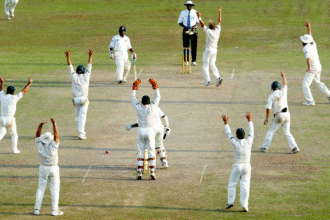Sunil Gavaskar’s Comments Stir Controversy: Australian Cricketers Respond to Allegations of Team Discord
The cricketing world is no stranger to controversies, especially during high-stakes series like the Border-Gavaskar Trophy. This time, Indian cricket legend Sunil Gavaskar’s remarks have sparked a heated debate, drawing sharp reactions from former Australian players. Gavaskars comments about Australian pacer Josh Hazlewood and the possibility of discord within the Australian team have led to a war of words that reflects the intensity of this cricketing rivalry.
Gavaskars Comments and the Alleged Rift
During the first Test of the Border-Gavaskar Trophy in Perth, Josh Hazlewood suggested that Australias batters should be held accountable for the team’s loss to India rather than the bowlers. His remarks came after Indias pace attack, led by Jasprit Bumrah, dominated the Australian lineup. Hazlewoods statements stirred speculation about potential friction between Australias bowlers and batters, a narrative that gained momentum when Hazlewood was ruled out of the second Test in Adelaide due to a side strain.
Also Read:JACKSONVILLE CAR ACCIDENT ATTORNEY: NAVIGATING LEGAL PATHWAYS TO JUSTICE
Sunil Gavaskar, a former Indian captain and now a commentator, added fuel to the fire with his remarks in a column for Sportstar. Gavaskar expressed skepticism about Hazlewoods injury, calling it a mystery. He even compared the situation to past Indian cricket controversies, where similar incidents were common.
The panic in the Australian ranks is palpable, Gavaskar wrote. The like of which used to be common in Indian cricket in the past. Now, its the Aussies, and like Old McDonald, Im simply loving it.
Australian Cricketers React
Gavaskars comments did not sit well with several former Australian cricketers, who wasted no time in dismissing his claims. Aaron Finch, Ryan Harris, and Lisa Sthalekar, among others, called out Gavaskar for what they described as unfounded and provocative remarks.
Aaron Finch, the former Australian captain, noted that Gavaskars tone had changed drastically since Indias victory in the first Test. Speaking on an ESPNcricinfo show, Finch remarked, Its not jabs anymore. Sunny is throwing haymakers over the top. During the first Test, he was respectful of the Australian team, but now hes gone bang.
Lisa Sthalekar, a former Australian womens cricketer, described Gavaskars comments as cheeky but believed he was stirring the pot deliberately. Weve all worked with him, and he can be very cheeky. Hes just having a bit of fun, she said on the same show.
Ryan Harris Labels Gavaskars Remarks as Garbage
Former Australian fast bowler Ryan Harris, however, took a much sterner stance. Speaking to The Indian Express, Harris dismissed the notion of factions within the Australian camp as garbage. He emphasized that team dynamics in Australia are free of the politics often associated with Indian cricket.
There are no factions. Thats just all garbage. I know it happens in India; Ive lived there. But that doesnt happen in Australia, Harris said. He also defended Hazlewood, stating that no player would be sidelined for expressing their opinion in a press conference.
Harris further highlighted the competitive nature of Indian cricket, acknowledging that India had emerged victorious in their last few tours of Australia. India is a very good team, and we need to give them credit for playing exceptional cricket, he said. However, he criticized the Australian media for amplifying the narrative of team discord, which he believed was baseless.
A War of Words or Mind Games?
Gavaskars remarks could be seen as strategic mind games aimed at unsettling the Australian camp. By drawing parallels to past Indian cricket controversies, Gavaskar cleverly turned the tables, shifting focus onto Australias internal dynamics. However, his comments also underscore the intense scrutiny players face during high-profile series.
Also Read:Trucking Injuries Attorney Houston: Seeking Justice After an Accident
The reactions from Australian cricketers reflect their frustration with the narrative being spun around Hazlewoods injury and comments. For players like Harris, the allegations of discord tarnish the reputation of the Australian team and its strong culture of unity.
The Broader Implications
This incident highlights the power of words in shaping narratives during cricketing battles. Gavaskars comments have not only added drama to the ongoing series but also reignited debates about cultural differences in cricketing nations. While Indian cricket has often been associated with internal politics, Australian cricket prides itself on its professionalism and camaraderie.
At the same time, the reactions from Australian players show a deep respect for Gavaskars legacy despite their disagreement with his remarks. Harris called him a legend of the game but lamented that his little grenade had been blown out of proportion by the media.
Conclusion
The Border-Gavaskar Trophy is much more than a cricket series; it is a clash of cultures, philosophies, and cricketing legacies. The controversy surrounding Gavaskars remarks is a testament to the intensity of this rivalry.
While Gavaskars cheeky comments have added spice to the series, the Australian teams reactions underline their determination to stay focused. As the series progresses, it will be interesting to see how this war of words influences the on-field action.
Cricket, after all, is not just about runs and wicketsits about the stories, rivalries, and emotions that make the game so captivating. In this case, Gavaskars mystery narrative has become another chapter in the rich history of India-Australia cricket battles.







